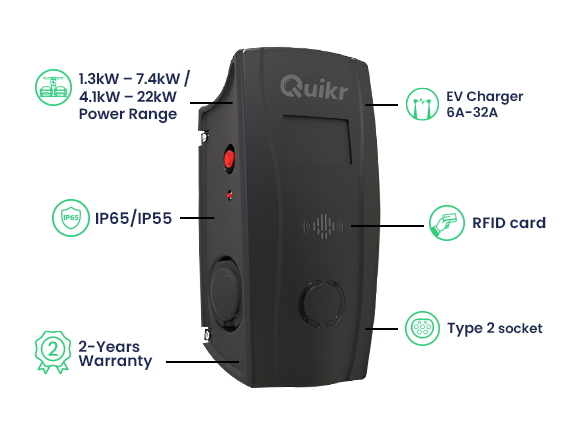The rise of electric vehicles (EVs) has led to an increased demand for efficient and fast-charging solutions.
One of the most advanced options available today is the OCPP Electric Car Charger 22kW Socket, which combines high-speed charging with smart connectivity.
But what makes this charger stand out? How does OCPP enhance EV charging? Which vehicles support 22kW charging, and is it feasible for home installation?
In this comprehensive guide, we’ll explore everything you need to know about the OCPP Electric Car Charger 22kW Socket, including pricing, reviews, technical specifications, and future trends for 2025.
What is OCPP in EV Charging?
OCPP (Open Charge Point Protocol) is an open-source communication standard that ensures interoperability between different EV charging stations and network providers. This means:
- EV drivers can use any OCPP-compliant charger, regardless of the manufacturer.
- Charging networks can integrate multiple brands seamlessly.
- Real-time data exchange enables smart charging, remote monitoring, and dynamic billing.
Why OCPP Matters in 2025
With the rapid expansion of EV infrastructure, OCPP plays a crucial role in:
✔ Standardizing charging networks
✔ Enabling smart grid integration
✔ Supporting renewable energy-based charging
Which EVs Can Charge at 22kW?
Not all electric vehicles support 22kW AC charging. Here’s a list of popular EVs in 2025 that are compatible:
| EV Model | Max AC Charging Speed |
|---|---|
| Tesla Model S/X | 22kW |
| Nissan Leaf (2025) | 22kW |
| BMW i4 | 22kW |
| Audi Q4 e-tron | 22kW |
| Renault Zoe | 22kW |
Note: Some EVs (like Tesla Model 3/Y) may require an adapter for 22kW charging.
Can I Get a 22kW EV Charger at Home?
Requirements for Home Installation
- Three-phase power supply (most homes have single-phase, limiting charging to 7kW).
- Professional installation by a certified electrician.
- Sufficient electrical capacity (check with your utility provider).
Pros & Cons of a 22kW Home Charger
✅ Faster charging (3-4 hours for a full charge vs. 7-8 hours on 7kW).
✅ Future-proof for high-capacity EV batteries.
❌ Higher installation cost (three-phase upgrade may be needed).
❌ Not all homes support three-phase power.
How Many Amps for a 22kW EV Charger?
A 22kW charger typically requires:
- 32-amp three-phase supply (400V).
- Type 2 socket (IEC 62196 standard).
Formula:
Power (kW)=Voltage (V)×Current (A)×3
For 22kW:
22,000W=400V×32A×1.732
Where is OCPP Used?
OCPP is widely adopted in:
🔹 Public charging stations
🔹 Workplace charging hubs
🔹 Commercial fleets
🔹 Smart city EV projects
OCPP vs. Proprietary Charging Networks
Unlike Tesla Superchargers (closed network), OCPP allows cross-brand compatibility, making it ideal for public and shared charging solutions.
How Fast is a 22kW Charger?
| Battery Size | Charging Time (22kW) |
|---|---|
| 40 kWh | ~2 hours |
| 60 kWh | ~3 hours |
| 80 kWh | ~4 hours |
Note: Actual speed depends on the EV’s onboard charger capacity.
Can I Use a 7kW Cable on a 22kW Charger?
- ❌ No!
- 7kW cables are not rated for higher currents.
- Risk of overheating and safety hazards.
✔ Always use a Type 2 cable rated for 32A or higher.
Why is My 22kW Charger Only Charging at 7kW?
Possible reasons:
- Single-phase power limitation (check your supply).
- EV’s onboard charger maxes out at 7kW.
- Software settings (adjust via OCPP backend).
OCPP 1.6 vs. OCPP 2.0.1: Key Differences
| Feature | OCPP 1.6 | OCPP 2.0.1 (2025 Standard) |
|---|---|---|
| Security | Basic encryption | Enhanced cybersecurity |
| Smart Charging | Limited support | Advanced load balancing |
| IoT Integration | Minimal | Full cloud & API support |
Is OCPP Mandatory?
While not legally required, most new charging stations in 2025 adopt OCPP for:
✔ Interoperability
✔ Scalability
✔ Smart energy management
What is a Charging Profile in OCPP?
A charging profile defines:
- Start/stop times
- Max power limits
- Dynamic pricing
- Renewable energy preferences
Example: A solar-powered home charger can prioritize charging only when excess solar energy is available.
OCPP Payment Systems in 2025
Modern OCPP chargers support:
💳 Credit/debit cards
📱 Mobile payments (Apple Pay, Google Pay)
🔑 RFID cards & subscription models
OCPP Electric Car Charger 22kW Socket Price (2025)
| Brand | Price Range | Key Features |
|---|---|---|
| ChargePoint | 1,200−2,000 | OCPP 2.0.1, Smart scheduling |
| Wallbox | 1,000−1,800 | Solar integration, App control |
| EVBox | 1,500−2,200 | Load balancing, Fleet support |
(Prices vary based on installation complexity.)
OCPP Electric Car Charger 22kW Socket Reviews
Top-Rated Models in 2025:
⭐ Wallbox Pulsar Plus 22kW – Best for home & business
⭐ EVBox Elvi 22kW – Top public charging choice
⭐ Zappi V2 22kW – Best solar-compatible charger
User Feedback:
✔ “Charges my Tesla in 3 hours!”
✔ “OCPP makes roaming between networks easy.”
❌ “Three-phase installation was expensive.”
Future of OCPP & 22kW Charging (2025 & Beyond)
🔋 Bidirectional charging (V2G)
🌍 100% renewable energy integration
📲 AI-powered load management
Final Verdict: Is the OCPP 22kW Charger Worth It?
✅ Best for:
- Fast home charging (if you have three-phase power)
- Businesses & fleets
- Future-proof EV infrastructure
❌ Not ideal for:
- Single-phase homes
- Budget-conscious buyers
Get Your OCPP Electric Car Charger 22kW Socket Today!
Ready to upgrade your EV charging experience? Contact Us Now for expert advice and installation services!





